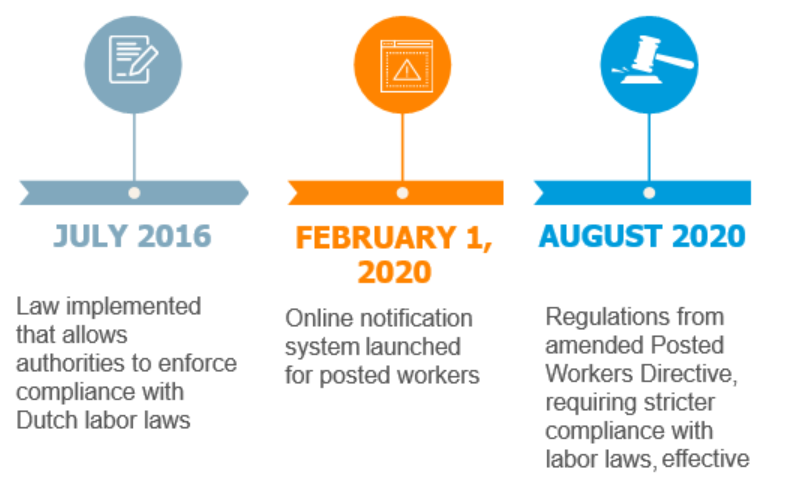Employment Regulations from Revised Posted Worker Directive Implemented
August 4, 2020
At a Glance
The Revised Posted Workers Directive covers the following key topics for employers posting workers in the Netherlands:
- The duration of the applicability of the employment laws of the host country;
- The applicability of employment rules for posted workers replaced with other posted workers; and
- Counting allowances for posted workers toward minimum salary requirements.
The situation
The employment regulations stemming from the Revised Posted Workers Directive went into effect in the Netherlands on July 30, 2020.
A closer look
The key points on the implemented changes include:
| New Rule | Impact |
|
Employment protections for long-term postings. In order to limit employer abuse of employment laws, the core employment laws of the host country apply for 12 months of the posted worker’s assignment in the Netherlands, with a possible six-month extension. For long-term postings, more thorough employment regulations apply. |
Employers must track the time posted workers spend in the Netherlands, and if long-term postings are common, must adopt policies to ensure compliance with Dutch employment conditions. |
|
Replacement of posted worker. If a posted worker is replaced by another posted worker for the same job at the same workplace, the first posted worker’s time in that position would be counted against the calculation of the 12-month stay period (18 months with an extension). |
Employers must keep track of the replacements of posted workers for the same position. |
|
New requirements for successive postings. If an employer replaces a posted worker with another posted worker in the same job at the same workplace, the replacement posting is subject to the same employment rules as the earlier posting. |
Successive posted workers are better protected from abusive employment practices by this new law. |
|
Remuneration. Employers can count allowances provided to posted workers – except for employee reimbursements for travel, board and lodging – toward minimum salary requirements. |
This change seeks to equalize pay between posted and local Dutch workers by preventing employers from applying travel, lodging and board allowances toward salary payments, effectively lowering the foreign employee’s salary. |
Background
The history of the directive’s implementation in the Netherlands is depicted below:

- Online notification requirement. The notification requirement of the Revised Posted Workers Directive was implemented on March 1, 2020. Since then, employers outside the Netherlands but within the European Union have had to file an online notification before a posted worker commences work in the Netherlands. The notification allows authorities to track whether employers have paid taxes and whether they are meeting minimum wage requirements and other mandatory employment conditions. The six-month grace period that applies for violations pertaining to the online notification requirement expires September 1, 2020.
- Posted Workers Directive adoption. The changes are the result of the Council of Ministers of the European Union amending the Posted Workers Directive to reduce fraud and to prevent employers from circumventing employment rules. Due to COVID-19-related delays, only a few EU countries have adopted the revised directive, including Belgium and Poland.
- Fragomen blog. For more information, see Fragomen’s recent blog on this topic.
Looking ahead
While the focus on compliance in the Netherlands has increased over the last two years for 'at-risk sectors' and sponsors of highly-skilled migrants, the Netherlands government is also seeking to attract foreign talent. For example, a new pilot program is expected to enter come into force in January 2021 which would allow start-up companies to not have to apply for a work permit for their foreign employees under certain conditions. The law is currently undergoing public consultation which will close August 11.
Fragomen will report on relevant developments.
This alert is for informational purposes only. If you have any questions, please contact the global immigration professional with whom you work at Fragomen or send an email to [email protected].














